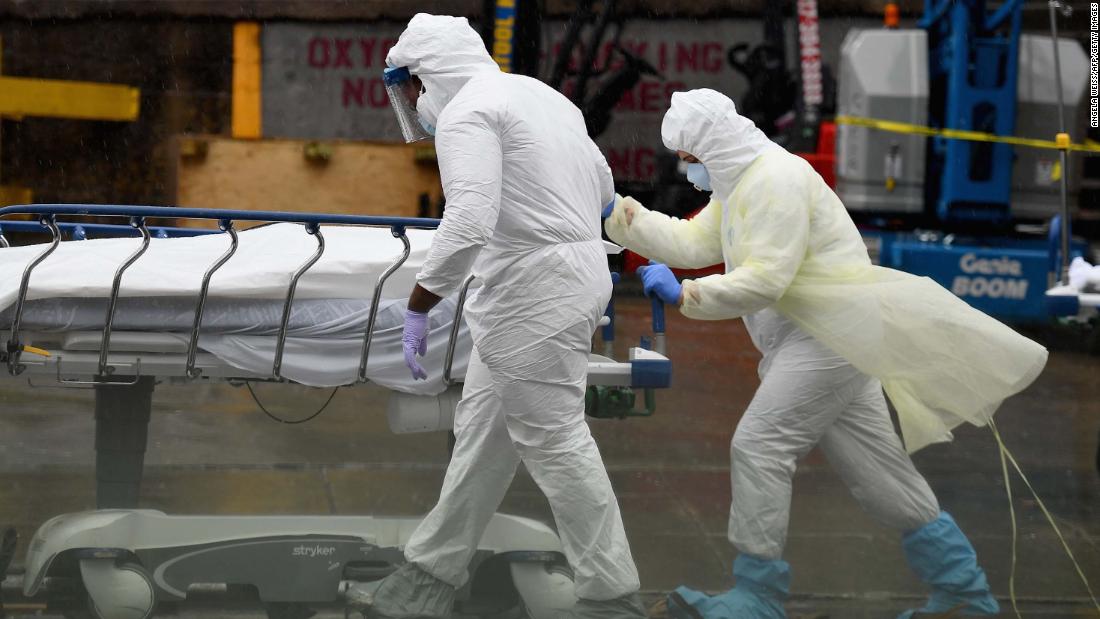
The 100,000 include Americans like 44-year-old Martin Addison, of New Jersey, the type of dad who'd do Donald Duck impressions to delight his infant son.
Black Americans represent 13.4% of the American population, according to the US Census Bureau, but counties with higher black populations accounted for more than half of all Covid-19 cases and almost 60% of deaths as of mid-April, a study by epidemiologists and clinicians found.
But concern was already rising in the US public health community about what came to be seen as the almost certain spread of the virus to the US and whether the country was prepared for its onslaught on hospitals.
On February 25, Nancy Messonnier, the head of the US Centers for Disease Control and Prevention's National Center for Immunization and Respiratory Diseases, infuriated the White House by warning that disruptions to daily life in the US could be "severe."
She told schools to start thinking about closures and businesses to prepare for telecommuting in a prediction that turned out to be an entirely accurate summation of America's destiny.
The preferred White House narrative was delivered the same day by economic czar Larry Kudlow — not for the first time in the weeks to come that an unqualified political appointee would pronounce on medical matters.
When it is silent, that causes its own issues, as the lack of urgency shown by many states in preparing for the onslaught shows.
A Columbia University study released last week found that had the US started social distancing a week earlier, it could have prevented the loss of at least 36,000 lives.
In the New York metro area alone, 17,500 fewer people would have died if the US had acted one week earlier, Columbia epidemiologist Jeffrey Shaman said.
New York's leaders put the blame on the Trump administration's failure to build a robust testing system that would have shown how deeply the virus had penetrated the community.
The first months of the pandemic's deadly path across America were dominated by fierce political arguments over deficiencies in testing needed to assess the virus' hold on the country.
In recent weeks, with most hotspots concentrated in big, more liberal cities and urban areas, a bitter debate has unfolded about the pace of opening the shuttered economy.
Trump says that the US has "prevailed" in the pandemic and has frequently boasted that the United States now leads the world in testing — a claim not supported by the crucial, per capita metric.
The US has a rate of 30 deaths per 100,000 in the population, significantly lower than hard-hit nations like Britain, France and Italy.
But the US is worse off than Germany with 10 deaths per 100,000 in the population and South Korea with 0.52 deaths per 100,000, according to figures prepared by Johns Hopkins University.
Anthony Fauci, one of the government's top scientists who have seen their public role sidelined as the White House moved toward full-throated support for opening, warned on CNN on Wednesday that the crisis was far from over.
With more and more states opening up, Fauci said possible spikes in infections would not be obvious for some time.
"When you do that and you see no negative effect in one week, please don't be overconfident," Fauci, director of the National Institute of Allergy and Infectious Diseases, told CNN.
"Because the effect of spreading is not going to be seen for two, three and maybe even more weeks -- and at that time you could have the uptick."
Such uncertainties, as well as the current lack of a vaccine and effective Covid-19 therapies explain why it's not clear whether the 100,000 death milestone will be the last grim and symbolic figure the US will mark.
The Institute for Health Metrics and Evaluation, or IHME, at the University of Washington has now shifted its prediction for US deaths down to 132,000 by August, amid signs that widespread wearing of masks is helping reduce infections.